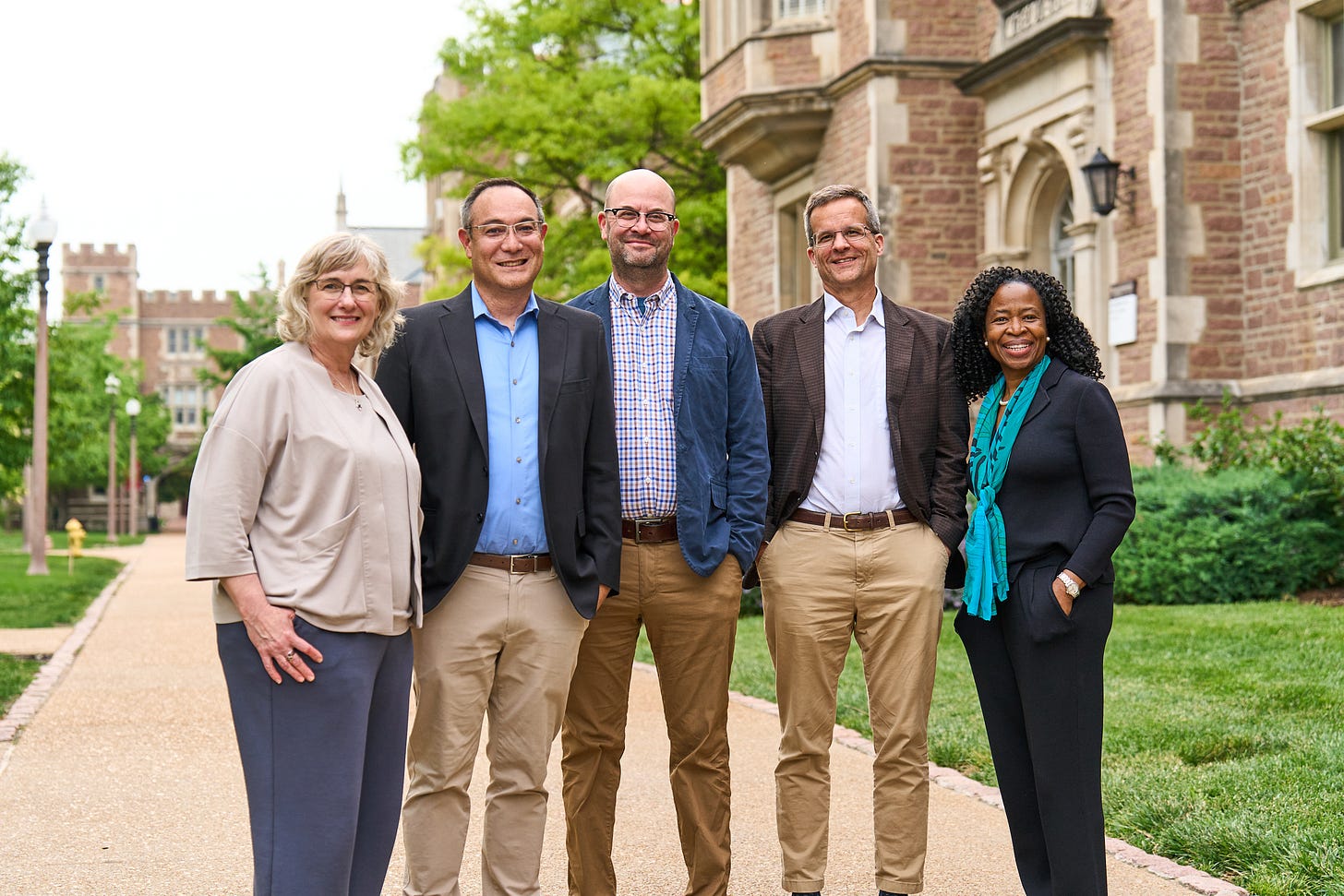Exploring Law Through a Christian Lens
Highlights from the Legal Vocation Fellowship's recent public dialogue

This past week, I hosted a three-day conference for the Legal Vocation Fellowship (LVF), a fifteen-month cohort experience for early career Christian attorneys. During our time together, we explored how Christians might think about the practice of law as a vocation with discussion-based lectures from five law professors: Rick Garnett (Notre Dame), Ruth Okediji (Harvard), Lisa Schiltz (St. Thomas), David Skeel (Penn), and me. We covered a wide range of readings, including selections from Augustine, Aquinas, Luther, Calvin, Kuyper, and MacIntyre, as well as some biblical texts.
On Thursday evening, LVF held a public dialogue titled “Redeeming Law” at Washington University School of Law. The dialogue explored connections between Christianity and the law and featured Professors Okediji, Schiltz, and Skeel, moderated by Professor Garnett.
Professor Okediji began by calling attention to the meaning of redemption:
We know that to redeem something is to give it back its value. And that means redemption has a role in all areas of brokenness: in our culture, our politics, and our relationships. In the context of the legal profession, there is a need to rediscover—and sometimes to infuse in the law—this redemptive vision.
Speaking from both personal and professional experience with disability law, Professor Schiltz focused on the importance of human anthropology to redeeming law:
If we want to redeem the law, we have to think about the vision of the human being that underlies the law that we’re talking about. Much of law today assumes an autonomous individual. For Christians, our fundamental notion of what makes all of us human and dignified is that we’re ultimately dependent and vulnerable.
Professor Skeel noted that part of seeing the law as a redemptive enterprise comes from highlighting connections between law and Christian theology. He shared some of these connections from his own field of bankruptcy law:
If you think about the gospel, what is the gospel about? It’s about the fact that we are alienated from God. There is no hope for redemption on our own. What we need is a fresh start. And a “fresh start” is a term of art in bankruptcy. The American bankruptcy system has the same trajectory. If you’re overwhelmed by debt, there’s no way to restore your financial standing within your community. Bankruptcy provides you a fresh start.
The panel also discussed the purpose of law, the inevitable tradeoffs of legal decision making, and the role of coercion and violence in law. On this last point, Professor Garnett asked the panelists to reflect on Robert Cover’s famous article “Violence and the Word,” which begins with the chilling pronouncement that “legal interpretation takes place in a field of pain and death.”
Professor Skeel responded:
I think that a lot of the power of Cover’s article is in showing us that the law is backed by violence. There’s a real temptation to deny violence and to pretend like it doesn’t exist—to think of law as antiseptic. When we talk about cases, we often abstract from the parties and just talk about the issues as if law is not affecting real people’s lives. But it is and I’ve always thought that was the real power of Cover’s article: to remind us that this is about real people’s lives and real power and coercion that’s being exercised.
Later in the discussion, Professor Okediji drew attention to more practical applications and the importance of finding joy in the mundane aspects of legal practice:
The radical love of Christ compels us to be utterly countercultural in our profession. We should be coming to discovery with joy. Or to the victory with joy, or to the defeat with grace. It is unfortunate in my view that law has become about whether you win or lose when in fact that’s not the essence of the law at all. The ultimate question is whether justice has been done.
She continued: “The best lawyering isn’t really about how much law you know but how much wisdom you can bring to the problem at hand.”
In selecting these few points (edited for clarity), I’ve only scratched the surface of the rich conversation. You can listen to the full dialogue here:
On a personal note, I am grateful to be undertaking the Legal Vocation Fellowship with friends in the legal academy, senior practitioners around the country, and an incredibly talented class of fellows. We’ve been meeting on Zoom since February, and it was a delight to convene together in-person this last week.
Our program now turns to a series of monthly Zoom sessions with a range of speakers who will shed light on the ways in which Christian lawyers might see themselves as:
Advocates
Peacemakers
Community Leaders
Counselors
Stewards
Prophets
Justice Bearers
Citizens
Children of God
By focusing on these different attributes, we hope to equip young Christian attorneys to be a more faithful presence in their workplace and to have a more holistic understanding of how their profession affects the rest of their lives and the lives of those around them.






